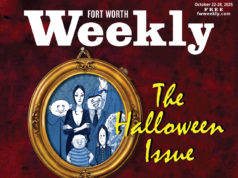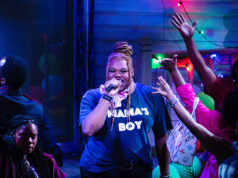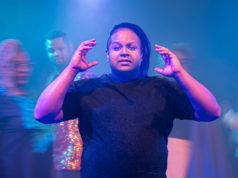I’ve been a theater critic for about a dozen years now, and I’ve never heard anyone say, “I can’t wait to see that show! I heard the stage lighting is awesome!”
Now, granted, most of my friends aren’t theater buffs, but still: While it’s significant, stage lighting just doesn’t command the same respect as, say, the acting, writing, or directing — and for good reason. A performance couldn’t exist without actors, a DELETE, or someone to violently hurl lattes everywhere. But you might not be so quick to relegate stage lighting to second-class status after you’ve seen the handiwork of Chad R. Jung. The resident stage-lighting designer for Amphibian Productions, Kids Who Care, and Fort Worth Opera, Jung brings an artist’s eye to his highly technical trade and does work that is, in the best ways, unlike any I’ve seen and more than worth the cost of admission. The New York Times recently described Jung’s handiwork on one of Amphibian’s Big Apple shows as “frequently mesmerizing.” Pretty high praise from the paper of record in the theater capitol of the world, especially for a 27-year-old Fort Worthian. “I figure if the show gets a lot of clapping or even a standing ovation, then that’s a sign that I did good work, even if the audience wasn’t completely aware of what I did,” said Jung (pronounced with a hard “J”). Jung’s style might be best described as contemporary-classical: no frills and lots of subtlety. For the suicide scene in FWO’s most recent production of Madame Butterfly at Bass Performance Hall, for example, he flooded the entire stage with crimson. Theatergoers and fans looking for an “experience” are advised to take their business elsewhere. “I saw a piece in New York that was, frankly, awful,” he said. “It was full of video monitors, and the stage moved, and the lighting was gaudy for the sake of being gaudy. I thought, ‘If you’re going to have this much technical stuff in it, why not make a movie?’”
Jung got turned on to theater as a teenager. He tried a few different hats — actor, stagehand, techie — before finally deciding on lighting. The myriad effects created by skillful manipulation of shadow, texture, and color intrigued him. “I wasn’t able to paint with paint very well,” he said. “But I began to see that I could paint with light.” After earning a degree in theater-lighting design from Texas Christian University, Jung took a series of entry tech jobs and eventually built up a resumé that included the Bruce Wood Dance Company, Ballet Austin, Fort Worth Symphony Orchestra, Dallas Opera, UNT Opera, and Metropolitan Classical Ballet. “[Jung] never goes on autopilot,” said Kathleen Culebro Anderson, Amphibian’s artistic director. She said his work easily compares to some of the best she’s seen on Broadway and off. “He really hones in on every aspect of the play — the actors, the sound, the sets, the blocking, and the costumes. He’s like the sauce that ties all the ingredients together. “He taught me a new appreciation of lighting design,” she continued, “because he made me realize what I was missing.” Jung is currently preparing to light two very different versions of A Christmas Carol: a scaled-down, straightforward rendition for Kids Who Care and a brassy musical interpretation by Casa Mañana, both at Bass Hall. Visit www.chadrjungdesign.com. — Jimmy Fowler
The Plan for La Mancha
It’s all downhill from the balletic rape scene on.
After being routed, pretty much accidentally, by hapless Don Quixote and his eager pal Sancho Panza and maiden Aldonza/Dulcinea, the dirtbags should have learned their lesson — that good always triumphs over evil — and allowed Aldonza/Dulcinea to “minister to” their wounds. Instead, the dirtbags let revenge overtake them, which leads to the flamboyantly choreographed attack and a pitiful ending. The musical version of Migeul de Cervantes’ masterpiece, with music by Mitch Leigh, book by Dale Wasserman, and lyrics by Joe Darion, is inherently flawed, and Casa Mañana’s production at Bass Performance Hall a couple of weeks ago didn’t deviate from history. Don Quixote was still the valiant knight-errant and also the alter ego of a deranged feudal lord who, with Sancho, seeks adventure and knighthood. The two arrive at an inn, where the dirtbags live off ale, and Aldonza serves them. Don Quixote falls in love with Aldonza and refers to her, against her wishes, as Dulcinea. Back at the ranch, the feudal lord/Don Quixote’s niece, nephew, and handmaiden wring their hands over him. There’s a fight, the attack, an epiphany, and the ending in which the feudal lord, who’s been shaken from his delusion only to end up on his deathbed, regains consciousness — but just long enough to recall his delusion and croak. Bor-ing!
The lead performances, however, were excellent, especially David McDonald in the roles of the lord/Don Quixote and Miguel de Cervantes. The actor’s title character was idiotic and decrepit enough to engender the audience’s sympathy and haughty and brawny enough to be dangerous; his author, meanwhile, was crafty, charismatic, and enthusiastic. Plus, he knocked “The Impossible Dream,” the musical’s showstopper, out of the park. But the story is still problematic. Now, not that you asked, but had I been given the director’s bullhorn, beret, equestrian boots, and coupon for endless lattes at Starbuck’s, here’s what I would have done: Instead of raping Aldonza/Dulcinea, the dirt-bags beg for her forgiveness. They all then sing a song about how wonderful optimism and sanitized bandages are. Instead of shocking his uncle Don Quixote back into reality — and giving him the heart attack that will do him in — the nephew, disguised as the Knight of Mirrors, is beaten up by the dirtbags, who, in a potentially quixotic move, had swooped in to save their new friend. But as soon as the head dirtbag is about to slay the knight, the lord/Don Quixote comes to his senses and realizes that it’s his nephew under the blade and calls off the dogs. Basically, the lord sacrifices his alter ego to save his nephew. The lord decides to return home, but before he goes, he takes off his “helmet” — really just a shaving pan — and places it on Aldonza/Dulcinea’s head. He says, “Don Quixote may be gone, but he lives on in all of us who dare to dream the impossible dream.” He then does a little soft-shoe routine and moonwalks off the stage. Everyone comes back out to sing a song about optimism and good mental health. The End. Now where’s my latte? — Anthony Mariani
Magical Con
Comic-book conventions are about as close as any of us are gonna get to living out our heroic fantasies — we’re not astronomically successful writers like J.R.R. Tolkien, Stephen King, or Stan Lee, and we’re not astronomically successful comic-book artists (yet!). Hell, we’re not even struggling character actors in commercials on FX. We’re just fanboys (and -girls) and aspiring artists, which is why nothing compares to going to a comic-con and getting to meet some of the industry’s most popular artists, writers, and Hollywood types with connections, professional or otherwise, to comicdom.
Nationally, Comic-Con is the industry’s big daddy, but it is put on only in Chicago and San Diego. Still, Wizard World, the only convention that comes through North Texas, isn’t too shabby — and local fans are grateful, since this is one of only four stops, the others being Chicago, Los Angeles, and Philadelphia. The scene at the Arlington Convention Center last weekend explains why: The convention, put on by Wizard magazine, the industry bible, was a blast.
A lot of industry greats made the scene: a bunch of Top Cow Comics stars, including owner and artist Marc Silvestri (The Darkness) and Darkness writer Phil Hester; DC’s Dan Didio (executive editor) and Ethan Van Sciver (artist, Green Lantern); Marvel’s Grek Pak (writer, World War Hulk) and J. Scott Campbell (artist, Spider-Man). There were some screen celebs, most notably the Incredible Hulk himself, Lou Ferrigno (who clearly makes his living off these things), and Maxim covergirl Laura Vandervoort (Supergirl, Smallville). But the starpower did not compare to that of years past — previous Wizard World-Texases have featured artist Jim Lee (Punisher: War Journal, The Uncanny X-Men, WildC.A.T.s), director Guillermo del Toro (Pan’s Labyrinth), and director Kevin Smith (Clerks, Dogma, Chasing Amy), among other giants.
Of course, any comic-con is defined by its fans, and from what I saw last weekend, we should be proud of ours — they were out in force, and other than a few true believers in costumes, most of the conventioneers looked more like normal, everyday people than Comic Book Guy from The Simpsons. — Cole Williams
Contact Kultur at kultur fwweekly.com.











